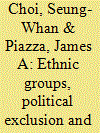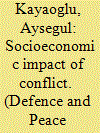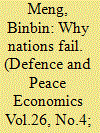|
|
|
Sort Order |
|
|
|
Items / Page
|
|
|
|
|
|
|
| Srl | Item |
| 1 |
ID:
143599


|
|
|
|
|
| Summary/Abstract |
This study examines whether the exclusion of ethnic groups from political power is an important contributing factor to domestic terrorism. To empirically test this question, we employ a negative binomial regression estimation on 130 countries during the period from 1981 to 2005. We find that countries in which certain ethnic populations are excluded from political power are significantly more likely to experience domestic terrorist attacks and to suffer from terrorist casualties; furthermore, ethnic group political exclusion is a more consistent and substantive predictor of domestic terrorist activity than general political repression or economic discrimination.
|
|
|
|
|
|
|
|
|
|
|
|
|
|
|
|
| 2 |
ID:
143603


|
|
|
|
|
| Summary/Abstract |
Uprising tensions during 2010 in eastern and southeastern regions of Turkey provoked arguments about the necessity for a State of Emergency (SOE; ‘Olağanüstü Hal’ in Turkish) declaration in those regions, with a belief of enduring political sustainability. The discussion is inflamed by a speech of the Nationalist Movement Party’s leader about the suggestion to announce a SOE ruling after the death of 24 Turkish soldiers in Hakkari (a city in the southeast of Turkey) in an attack of the PKK (Kurdistan Workers’ Party) on the 19 October 2011. Although a new announcement of SOE did not take place, the discussion itself induced the idea behind this paper which is to provide a quantitative analysis of the SOE in Turkey. In fact, the SOE ruling is not a new concept for Turkey and it has been implemented in 13 cities in the eastern and southeastern regions from 1987 to 2002. Although there have been many discussions about the costs of these 15 years of the SOE ruling in terms of military expenditure and, thus, on the national budget, there is a lack of quantitative analytical examination of the economic and social costs of it. Difference-in-differences analysis reveals negative spillover impacts of the SOE, especially on the forced migration, unemployment, and educational investments. The results also show that SOE ruling is an important factor for the underdevelopment of the eastern and southeastern regions in Turkey and, thus, a new SOE will bring enormous inequalities, both economically and socially, and an intensification of the ethnic tensions in Turkey.
|
|
|
|
|
|
|
|
|
|
|
|
|
|
|
|
| 3 |
ID:
139211


|
|
|
|
|
| Summary/Abstract |
Both the increasing defense spending and the widening divergence between rich and poor countries are of great concerns. This paper attempts to explain the two concepts in a unify theory framework. In the view of conflict economics, a nation’s defense spending can be seen as the fighting commitment of distributive effort in the global economy while other is the productive effort. The development of global economy needs the productive efforts from almost every nation, and the distribution of the aggregate output is determined in large degree by the fighting commitment of each nation. The numerical simulation of the model gives a reasonable explanation of the patterns of the divergence/convergence of prosperity-poverty gap between nations, the fact which is evidenced by many empirical analyses. (1) Given the initial wealth ratio between nations fixed, there is a critical value of fighting decisiveness, when the actual value is larger than the critical value, it is more likely to result in Matthew effect; otherwise the gap would gradually be shortened. (2) Given the fighting decisiveness fixed, there is a critical value of initial wealth ratio, when the actual value is larger than the critical value, it is more likely to result in Matthew effect; otherwise, the gap would gradually be shortened. The study gives a new perspective to explain and handle the increasingly defense spending and the prosperity-poverty gap between nations.
|
|
|
|
|
|
|
|
|
|
|
|
|
|
|
|
|
|
|
|
|